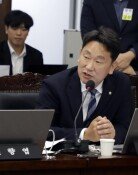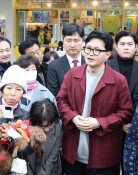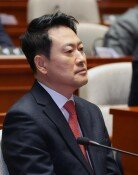[Editorial] Some suggestions on cabinet reshuffle
[Editorial] Some suggestions on cabinet reshuffle
Posted August. 04, 2000 11:07,
Following the 1997 presidential election, president-elect Kim Dae-Jung made it clear that he would guarantee the terms for the cabinet members for ample time so that they can implement policy measures consistently and resolutely, in light of his predecessor Kim Young-Sam`s failures in his personnel management. But his commitment has not been kept. Even during the crucial time of financial crisis in early 1998, he changed economic ministers frequently. The ministers of finance and economy, industry and energy, and construction and transportation were replaced three times since taking office in early 1998, and if these portfolios are replaced again in the upcoming cabinet shakeup, they are subject to dismissals fourth time.
As cabinet members were often reshuffled since his presidential inauguration, the ministers have been rendered powerless. Of late, Economy-Finance Minister Lee Hun-Jai and Financial Supervisory Commission Chairman Lee Yong-Keun made phone calls on Hyundai Group chairman Chung Mong-Hun but the latter made no return calls, indicating that how much the business tycoons think light of the economic ministers. The economic ministries, for that matter, gruntled that owners of conglomerates or chaebol are trying to make direct deals or contacts with more powerful Chong Wa Dae and the governing party, skipping the economic ministers concerned. President Kim once said that he said that he would personally take charge of important economic affairs, but he should rather grant more authority to his economic ministers, so that they can directly manage their proper business.
Before conducting shuffle of the economic ministers, the President should make clear his policy line for the rest of his term, along with comprehensive appraisal of their policy accomplishments, and then he select persons who are most qualified for the prescribed tasks. If the present ministers are rated as doing well, there is no need for their displacements. And if replacements of some ministers are deemed necessary, their successors should be filled by the most competent persons who are most qualified to push strongly ahead with the stagnant corporate and financial restructuring reforms.
Admittedly, the economic ministries were raised different voices one another and showed disarray in policy coordination. Therefore, the finance-economy minister, who will be promoted to the vice prime minister`s level with the projected revision of the Government Organizational Law, needs to be most competent personality who will be able to achieve coordination among the economic ministers as the head of the economic team.
Kim Chong-In, who is speculated to be appointed as the finance-economy minister, served as the senior presidential secretary for economic affairs under the Roh Tae-Woo regime, was convicted of his embezzlement but acquitted and his civil rights are reinstated of late. If he is really named the chief economic minister, this would mark a wide departure from the proposed reformative cabinet, and there is the possibility of fueling corruption and instability among the government officials.
Surrounding the portfolios to be assigned to the United Liberal Democrats, unsavory rumors are rampant that some ministerial hopefuls are jockeying for the blessing of ULD leader Kim Jong-Pil. If these political mongers who lack professionalism take ministerial posts, it is of no benefit to both the government and the ULD. Under the circumstances, a refreshing report has it that Prof. Chung Woon-Chang of Seoul National University declined an offer for the post of senior presidential secretary for economic affairs, on the ground that he is less qualified for the position of managing the nation`s overall economic affairs, though he is a specialist on international economy.
As for the security and unification ministers` team, there are pros and cons over the fact that the director-general of the National Intelligence Service, Lim Dong-Won, came to the front of the inter-Korean negotiations. But he may well play a behind-the-scene role on the basis of his information capability and architect of inter-Korean policy formulation. In order to achieve perfect coordination among the security and unification-related officials and to implement the inter-Korean summit agreement without fail, those who triggered row with inappropriate remarks for their popularity need to be negatively assessed in connection with the cabinet shakeup.







